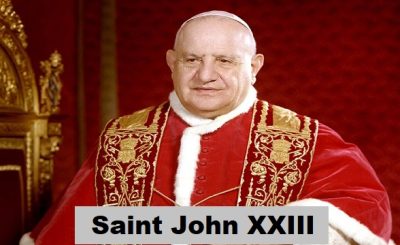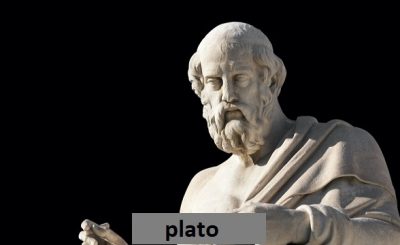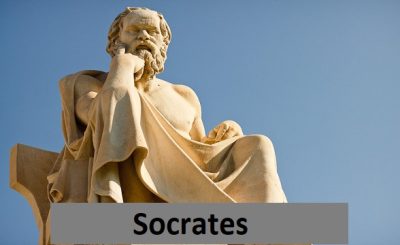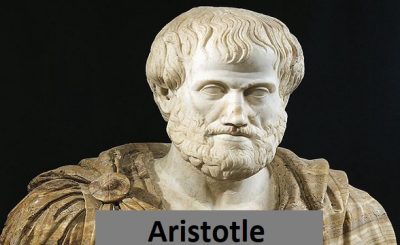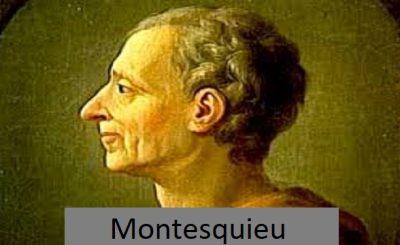St. John Paul II, born Karol Józef Wojtyła on May 18, 1920, in Wadowice, Poland, was the first Polish Pope and the second longest-serving Pope in history. From 1978 until his passing in 2005, he was the Pope.
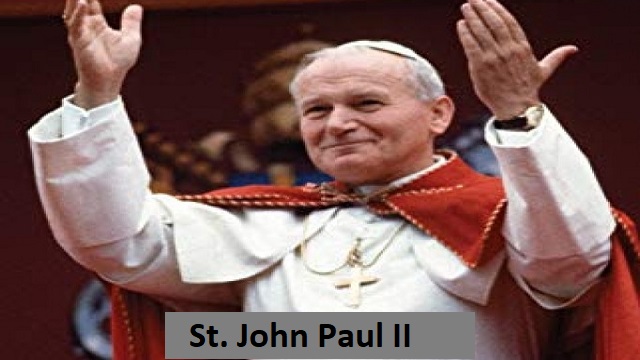
Early Life:
Karol Wojtyła was the youngest of three children in his family. His mother died when he was young and his father, a retired army officer, raised him. Wojtyła was an avid athlete and a talented actor, and he often performed in plays to support the underground theater during the Nazi occupation of Poland.
Influences:
Family and religion: Wojtyła was raised in a devout Catholic family, and his religious beliefs were shaped by his family and his local parish.
Nazi Occupation: The Nazi occupation of Poland had a profound impact on Wojtyła. He saw first-hand the violence and oppression that the Nazis inflicted upon the Polish people, and this experience deepened his faith and commitment to social justice.
Personal Loss: The loss of his mother, older brother, and father had a profound effect on Wojtyła and shaped his compassion and understanding of human suffering.
Intellectual Formation: Wojtyła was an intellectually curious person and was deeply influenced by the works of St. John of the Cross, St. Teresa of Avila, and St. Therese of Lisieux, as well as the philosophy of St. Thomas Aquinas and the personalism of Emmanuel Mounier.
Love of Culture: Wojtyła was a lover of culture, particularly the arts, and he saw the role of the arts as a means of expressing the beauty and truth of the Christian message.
These influences shaped Wojtyła into the person he would become, and helped to form his vision for the Catholic Church and the world. As Pope, St. John Paul II would use his experiences, intellect, and love of culture to spread a message of hope, peace, and understanding.
Decision to Join the Priesthood
St. John Paul II (Karol Józef Wojtyła) was a Polish priest, bishop, and cardinal who served as the Pope from 1978 until his death in 2005. He was the first non-Italian pope in more than 450 years and the second longest-serving pope in history.
His decision to join the priesthood was shaped by a number of factors, including his personal faith, his experiences growing up in Poland during World War II, and his desire to make a difference in the world.
As a young man, Karol Wojtyła was deeply spiritual and felt a calling to serve others. He was involved in various Catholic youth organizations and was known for his strong faith and devotion. During World War II, he witnessed the suffering of his countrymen and felt a strong sense of responsibility to help those in need. This experience deepened his faith and helped him to understand the importance of service to others.
In 1942, after completing his studies at Jagiellonian University, Wojtyła decided to pursue a vocation to the priesthood. He was ordained a priest in 1946 and served as a parish priest in Kraków until he was appointed Archbishop of Kraków in 1963. In 1967, Pope Paul VI elevated him to cardinal status.
Throughout his priesthood and papacy, St. John Paul II was known for his commitment to social justice and his deep concern for the poor and marginalized. He worked tirelessly to promote peace and understanding between different cultures and religions, and he encouraged people of all ages to deepen their faith and spiritual lives.
In conclusion, St. John Paul II’s decision to join the priesthood was shaped by a combination of his personal faith, his experiences growing up in Poland during World War II, and his desire to make a difference in the world. His legacy as a spiritual leader, peacemaker, and champion of social justice continues to inspire people around the world.
Actions as cardinal of St. John Paul II
Pope St. John Paul II, born Karol Józef Wojtyła, served as the head of the Catholic Church from 1978 until his death in 2005. He was the first non-Italian pope in more than 450 years and the second longest serving pope in history. During his papacy, St. John Paul II made significant contributions to the Catholic Church and had a profound impact on the world. Here are some of his most notable actions as the cardinal of St. John Paul II:
Interfaith Relations: St. John Paul II made it a priority to promote interfaith dialogue and understanding between different religions. He visited synagogues, mosques, and temples and sought to build bridges of understanding and cooperation between different faith communities.
Youth Outreach: St. John Paul II had a special bond with young people and made it a point to reach out to them. He established World Youth Day, an international gathering of young Catholics, to encourage them in their faith and help them to become leaders in their communities.
Pro-Life Advocacy: St. John Paul II was a strong advocate for the sanctity of human life and spoke out against abortion, euthanasia, and other forms of violence against the vulnerable. He called for greater respect for human life at all stages and challenged the world to recognize the inherent dignity of every person.
Solidarity with the Poor: St. John Paul II was a champion for social justice and the rights of the poor. He spoke out against poverty, oppression, and injustice and called for greater solidarity with those who were marginalized and suffering.
Theology of the Body: St. John Paul II developed a unique theology of the body which emphasized the importance of the human body in God’s plan for humanity. He taught that the body and sexuality are integral to our human identity and called for a deeper understanding and appreciation of the body in our spiritual lives.
Advocating for Peace: St. John Paul II was a strong advocate for peace and worked to promote peace and nonviolence throughout the world. He spoke out against war and terrorism and called for greater efforts to promote reconciliation and understanding between nations and cultures.
These are just a few of the many actions and initiatives of St. John Paul II during his papacy. His legacy continues to inspire and influence people around the world and he is remembered as one of the most influential leaders of the 20th century.
Election as pope
The election of Pope St. John Paul II took place on October 16, 1978, following the death of Pope John Paul I, who had been in office for only 33 days. The election was conducted by the College of Cardinals, the highest-ranking members of the Catholic Church after the Pope, and was held in the Sistine Chapel in Vatican City.
The election process followed the traditional rules laid out in the Apostolic Constitution Universi Dominici Gregis, which was issued by Pope John Paul II in 1996. According to these rules, the election of the Pope is a secret process and is conducted by the College of Cardinals, who are the only ones eligible to vote. The voting process begins with a series of ballots, with a two-thirds majority required for election.
In the election of Pope John Paul II, the voting process lasted eight days, during which time the Cardinals held several rounds of voting. On the eighth day, Cardinal Karol Wojtyła, the Archbishop of Krakow, was elected as the new Pope with a majority of votes. In honor of his predecessor, Pope John Paul I, he decided to go by the name John Paul II.
Pope John Paul II was the first non-Italian Pope in 450 years and his election was seen as a turning point for the Catholic Church. He was widely regarded as one of the most influential figures of the 20th century, and his pontificate lasted for more than 26 years, until his death in 2005. In 2014, Pope Francis recognized him as a saint and canonized him.
Ecclesiastical and Theological Contributions
St. John Paul II, born Karol Józef Wojtyła, was a Polish priest who served as the Pope of the Roman Catholic Church from 1978 until his death in 2005. During his 27-year papacy, St. John Paul II made significant contributions to the fields of theology and the Catholic Church, which continue to influence the Church and its teachings today.
Theology of the Body: St. John Paul II’s most significant theological contribution is his exploration of the human person and human sexuality, which he presented in a series of 129 Wednesday audiences known as the “Theology of the Body. He emphasized the significance of viewing the human body as a gift from God and argued that one’s sexuality is an essential component of who they are identity as a person created in God’s image. He also stressed the importance of chastity and the beauty of the sacrament of marriage.
Ecumenism: St. John Paul II was a strong advocate for Christian unity and worked towards greater cooperation and understanding between different Christian denominations. He held several historic meetings with leaders of other Christian denominations, including the Ecumenical Patriarch of Constantinople and the Archbishop of Canterbury, and he also established the Pontifical Council for Promoting Christian Unity.
Interreligious Dialogue: St. John Paul II was also a leader in promoting interreligious dialogue, especially with the Jewish and Muslim communities. He made several trips to the Holy Land, where he met with leaders of the Jewish and Muslim communities, and he also established the Council for Interreligious Dialogue to promote greater understanding between different religious traditions.
Marian Devotion: St. John Paul II was known for his strong devotion to the Virgin Mary and her role in the life of the Church. He instituted the Marian Year in 1987 to commemorate the 100th anniversary of the Marian apparitions in Lourdes, France, and he also wrote several encyclicals and other writings on Marian devotion’s significance in church life.
Social Justice: St. John Paul II was a fervent supporter of human rights and social justice. He made numerous trips to countries around the world, including countries under totalitarian regimes, to speak out on behalf of the oppressed and marginalized. He also wrote several encyclicals on social issues, including “Laborem Exercens” on the role of work in society, and “Sollicitudo Rei Socialis” on social concern for the poor and marginalized.
These are just a few of the many contributions that St. John Paul II made to the Catholic Church and the world of theology. His legacy continues to influence the Church and its teachings today, and he is remembered as a beloved and influential leader of the Catholic Church.

